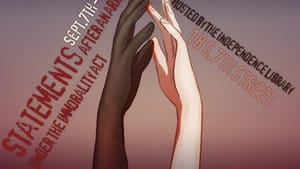Stay in the Loop
BSR publishes on a weekly schedule, with an email newsletter every Wednesday and Thursday morning. There’s no paywall, and subscribing is always free.
Love isn't all you need
Philly Fringe 2017: Blue Mercury presents Athol Fugard's 'Statements After an Arrest...'

Sex between piles of books — what more could you ask for? Maybe not to be imprisoned for it. In Blue Mercury Theatre’s boldly intimate production of Athol Fugard’s Statements After an Arrest Under the Immorality Act, interracial lovers in apartheid-era South Africa meet when a black man from a nearby township begins using the local library’s back door. While pursuing his research, he finds a kindred spirit in the white librarian on staff. They begin a passionate, clandestine affair among the books after hours, until a suspicious neighbor sends the police.
The play is a sort of nexus of taboos: love, sex, and academics; an interracial affair; infidelity; prolonged nakedness onstage.
Europeans and everyone else
According to Leigh E. Bicica’s director’s notes, the performance is set in 1966, though the books that conspicuously edge the performance space reflect our moment (including a tome on Donald Trump’s America). But it seems to me this story could take place in any number of decades. (Fugard merely specifies the time period as “1980s, 1970s, 1960s” and the setting as a library “during the apartheid era.”)
The parliament of South Africa passed the Immorality Act, banning sexual relationships between white people and “natives,” in 1927. In case anyone was confused, this was updated in 1957 to specify that all sex between “Europeans” and “non-Europeans” was illegal (“European” meaning “a person who in appearance obviously is, or who by general acceptance and repute is a European,” with the same going in reverse for non-Europeans, whatever their race). Fugard wrote this play in 1972; the official prohibition was still in effect for more than a decade after that, and was formally lifted in 1985.
It’s a timely show to mount in this year’s Fringe, with this past June marking the 50th anniversary of the U.S. Supreme Court ruling legalizing interracial marriage in all 50 states.
Fugard at the Free Library
Freida Joubert (Megan McDermott) and Errol Philander (Brandon Pierce) are the only two characters to appear onstage. Blue Mercury’s bare-bones production is set in the darkened Independence Library, near Washington Square. An offstage voice, presumably actor Jay Stratton, listed in the playbill as Detective Sergeant J. Dupreez, interrogates the lovers once the strobes of a police officer’s camera catch their entwined bodies.
McDermott and Pierce, who commune and then face the humiliations of the police, give involving, nuanced performances within a close-set circle of chairs, sheet-draped bookshelves as their only backdrop in the gloom. (The action is poignantly staged in front of the library’s collection of LGBT literature.) Under Bicica’s direction, they convey a universe of human study, connection, and injustice within the confines of a single blanket spread on the ground. Pierce, a Philly-based UArts alum and Shakespeare veteran, does admirable work with a difficult dialect, capturing the heavy yet crisply musical consonants of a black South African speaker.
In several points of dialogue, Philander is described as “colored,” which in South Africa specifically signifies a person of mixed race. If this is Fugard’s intent for Philander, it may add more depth to the characters’ history and predicament that is lost when someone who doesn’t appear biracial plays the role — but for a reminder of the ultimate absurdity of defining someone’s heritage based on appearances, see the Immorality Act’s 1957 amendment.
“No prospect of an end”
The play’s early dialogue between its two avid learners ranges over the forces of biology and geology that operate through millennia. Philander repeatedly quotes 18th-century Scottish scientist James Hutton, who posited that the geological forces we observe at work today have always been operating and will continue to do so: “We find no vestige of a beginning, no prospect of an end.”
This sweeping awareness of the life of our planet itself makes stark contrast with the puny, irrational human hatreds that codify love by skin color. Or maybe it’s a metaphor for the intractability of our prejudices, which seem to persist today as surely as the earth’s crust still moves.
Similarly, the characters’ nakedness may serve both as an elemental nod to simply being human, while it also heightens the contrast between the two bodies.
The production gives a final punch as Philander, alone onstage, mourns the emptiness inside him under apartheid’s laws, then abruptly walks offstage. The audience waited for a curtain call that never came, until,finally, disoriented and maybe a little anxious, we gathered our things and trickled out the door in the silence.
What, When, Where
Statements After an Arrest Under the Immorality Act. By Athol Fugard, Leigh E. Bicica directed. Blue Mercury Theatre. Through September 24, 2017, at the Independence Library, 18 S. Seventh Street, Philadelphia. (215) 413-1318 or fringearts.com.
Sign up for our newsletter
All of the week's new articles, all in one place. Sign up for the free weekly BSR newsletters, and don't miss a conversation.
 Alaina Johns
Alaina Johns